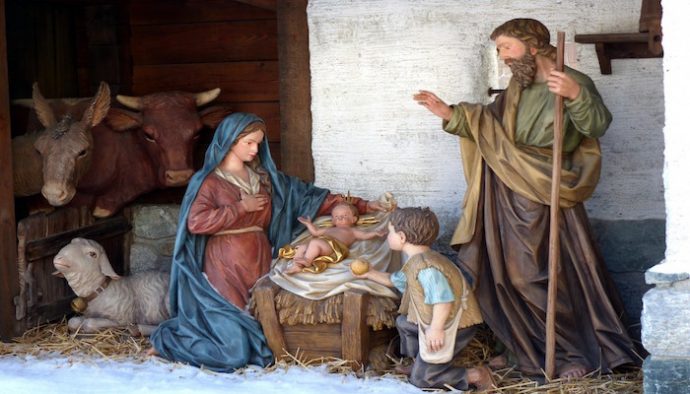In 1865, William Chatterton Dix was a manager of an insurance company. Life was going along fine until Dix suddenly contracted an unexpected and very severe illness. He was bedridden for some time, and during that time he also suffered severe depression, all of which brought him to a point of spiritual renewal when he eventually began to recover. It was then that he took up the Bible again and in so doing began to write. One of the things he wrote was the song we know as “What Child is This?”
In the song, we find all the characters we’re accustomed to in the Christmas story: Mary, the angels, the shepherds, the animals, and even the wise men make a brief appearance (though their coming was in reality much later than the night Jesus was born). All of this serves, in the song, to answer the question of Christ’s identity. That this is Christ the King, though the circumstances would say something very different.
A ways down into the song we find this line: “Come, peasant, king to own Him”, and this is the invitation of Jesus. Come, no matter what your background. Come, no matter your education. Come, no matter your supposed righteousness or earthly power. Come if you’re a peasant and come if you’re a king, and what you’ll find is that the ground is level here at the feet of Jesus. Everyone is laid bare as sinner in need of grace here no matter what anyone tells you in the rest of your life.
We find the peasant and the king both coming to Jesus in the Christmas story. First the king:
“After Jesus was born in Bethlehem of Judea in the days of King Herod, wise men from the east arrived unexpectedly in Jerusalem, saying ‘Where is He who has been born King of the Jews? For we saw His star in the east and have come to worship Him.’ When King Herod heard this, he was deeply disturbed, and all Jerusalem with him…” (Matthew 2:1-3).
There was a reason that the whole city went into panic when Herod was displeased, for he was insanely suspicious.
If anyone was suspected to be a rival to his power, that person was eliminated. He had killed many members of the Sanhedrin when he came to power. Later he slaughtered 300 court officers. He murdered his wife and her mother. He assassinated his oldest son and 2 others. The Roman Emperor Augustus said that it was safer to be Herod’s pig than his son. When it came time for him to die later, he ordered that the most distinguished citizens of Jerusalem should be arrested on trumped up charges and imprisoned, and that the moment he died, they be executed. He was determined that someone would be crying when he died, even if not for him.
Now come these three dignitaries from the east. Herod was secure to the west; that’s where the support of Rome was. But in the east, there were enemies. In fact, Herod had spent the better part of his first years in power building fortress-palaces along the eastern border of the country to repel any attack which might someday come. And here, into his palace, come three high ranking officials from the suspicious east asking about a baby that was born who they were calling the king of the Jews. All in all, this was a recipe for disaster for an insecure ruler, and we know the rest of the story, shocking though it is.
Consider this: Herod was around 70 years old at this time, and yet was so drunk on his need for power and control that he was willing to commit genocide because of one baby based on an obscure prophecy from a religion that he himself did not even believe in.
Such is the way when one’s very core is threatened; they will go to great, great lengths to make sure that what they have is protected. Insecurity has a way of doing that to you.
But there is a foil in this Christmas story for Herod. A foil for the king. The peasant, Joseph.
In contrast to this threatened king is a regular guy. An uneducated tradesman with no real aspirations and no real dreams. It’s a man who married a woman of questionable reputation and became a father to an unknown child. It’s the one who moved his family all over the place, away from family, into the pagan land of Egypt, then to the sticks out in Nazareth. This is the man who sacrificed his livelihood, his reputation, his career – everything – and then simply drifts out of the pages of history.
Here is Joseph, the sacrificial father, standing humbly in contrast to the threatened king. The regular guy versus the powerful dignitary. The ordinary man versus the person of privilege. Yet these two men had something in common, and it’s that they both recognized at some level the response required to this meager baby born in a humble stable.
And that response is all.
Everything.
Our very lives.
Every hope, dream, ambition – all must be brought to this new king and laid at his feet in faith. For some, that’s just too much. But then there are others who find, even sometimes to their own surprise, their willingness to do so.
The question for us, then, is whether we will fall in line with the threatened king who clung so desperately to all he had built for himself or the sacrificial father who lost Himself in the greatness of Jesus. Come peasant, come king – but come. And bring all you have.
Subscribe to MichaelKelley.co
Never miss a new post. Subscribe to receive these posts in your inbox and to receive information about new discipleship resources.





1 Comment